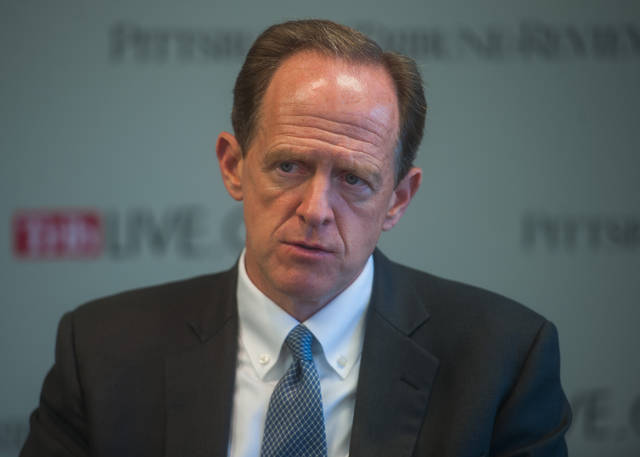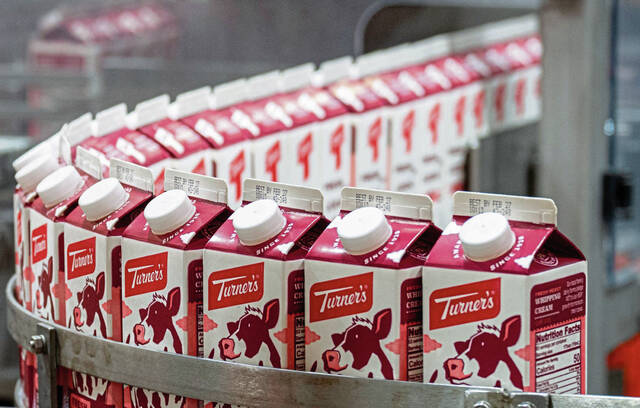Pat Toomey, Pennsylvania’s Republican U.S. senator, went on the offensive Wednesday against the Trump administration’s trade policies, promoting a bipartisan bill to strip the president of the authority to impose tariffs based on national security.
Speaking at a Washington, D.C., news conference focusing on the impact of steel and aluminum tariffs as well as a raft of proposed tariffs, Toomey said President Trump’s 2018 tariffs on steel and aluminum served no national security purposes and hurt Pennsylvania companies.
“Trade is good for America. About 1.4 million jobs in Pennsylvania are supported by international trade. But trade wars are very, very dangerous,” Toomey said.
And the toll is adding up in Pennsylvania.
“Toomey pointed to Pittsburgh-based ATI (Allegheny Technologies). The company was forced to pay $16 million to import slab steel; American Keg, the sole producer of stainless steel kegs in America, had to lay off one-third of its workforce when steel prices spiked; and Colonial Metal Products in Hermitage, a tinplate producer, took a major financial hit when tariffs caused prices for raw materials to spike.
Economists with Trade Partnership Worldwide brought Toomey and fellow U.S. Sens. Mark Warner, D-Va., Tom Carper, D-Del., and Ron Johnson, R-Wis., together to talk trade as they unveiled a study that projected the harmful impact existing tariffs — and more slated to go into effect March 1 — could have over the next three years.
Laura M. Baughman, an author of the study titled “Tariffs Hurt the Heartland,” said a best-case scenario shows a loss of 934,000 jobs affecting every state as well as an added cost of $767 a year for the average U.S. family of four.
While the senators conceded that America must take a tough stance in trade negotiations with China, they said additional tariffs could have wide-ranging impacts.
Carper said the quid pro quos of a trade war that tariffs could spark threatens even chicken farmers in his home state of Delaware, where massive poultry operations are spread across part of the Delmarva Peninsula. Today, farmers there rely on exports to sell 20 percent of the chickens they raise, Carper said.
ATI President and CEO Bob Wetherbee said the existing steel tariffs — known as section 232 tariffs — are hurting the specialty materials producer.
“The Section 232 tariffs have unintended consequences that are resulting in lower U.S. production for ATI and the possible elimination of nearly 100 well-paying ATI jobs in Midland, Pa., which we reopened in December 2017,” said Wetherbee, referencing the plant where tariffs added $16 million to production costs last year.
Other Pennsylvania manufacturers have been more complimentary of Trump’s trade policies. The owners of Dura-Bond, an Export-based company that makes and coats steel pipe, said they suffered from a glut of product because of foreign dumping before Trump invoked steel tariffs last year.
Although some companies have benefited from the tariffs, Baughman said her study shows job losses would dramatically outweigh gains over the next one to three years if existing and proposed tariffs are allowed to be in place.
Toomey acknowledged that Trump’s steel and aluminum tariffs helped bring Mexico and Canada to the table to reopen NAFTA negotiations.
“But the new NAFTA has hurt us. What good is it if the outcome is a diminished relationship between really important trade partners,” he said.
Warner said tariffs on aluminum have trickled down to craft brewers in Virginia who can’t afford aluminum cans.
“This administration’s trade policies are hurting businesses, they’re hurting workers, they’re hurting farmers,” said Warner, who has signed on as a co-sponsor to Toomey’s bill.
The bill would force Trump and future presidents to get Congressional approval before imposing tariffs for national security purposes.
“It would restore the responsibility for tariffs to Congress,” Toomey said. “The Constitution is very clear that responsibility for tariffs lies with Congress. If the president wants (tariffs) for national security, he must go to Congress and get approval.”
Instead of fewer tariff powers, however, Trump appears set on trying to expand his ability to impose tariffs — and without Congressional approval.
During his State of the Union address Tuesday, the president asked Congress to approve the United States Reciprocal Trade Act, a bill introduced last month by U.S. Rep. Sean Duffy, R-Wis.
“If another country places an unfair tariff on an American product, we can charge them the exact same tariff on the same product that they sell to us,” Trump said in his address.
Deb Erdley is a Tribune-Review staff writer. You can contact Deb at 724-850-1209, derdley@tribweb.com or via Twitter @deberdley_trib.








